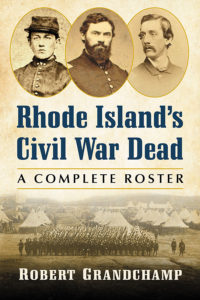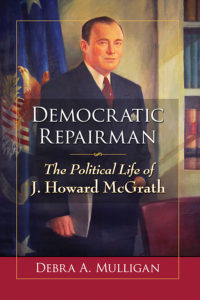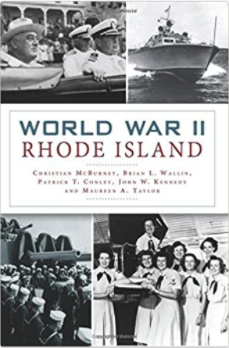Recently, there has been a spate of Rhode Island history books published by smallstatebighistory.com authors. These are in addition to Untold Stories of World War II Rhode Island (History Press, 2019), by Christian McBurney, Norman Desmarais, and Varoujan Karentz. One or more of these books would make great Christmas or other holiday presents (after you have read them yourself!). Many are available at local independent book stores and historical society gift shops.
Rhode Island’s Civil War Dead. A Complete Roster. By Robert Grandchamp. McFarland, 2019. $39.95.
Rhode Island sent 23,236 men to fight in the Civil War. They served in eight infantry regiments, three heavy artillery regiments, three regiments and one battalion of cavalry, a company of hospital guards and 10 batteries of light artillery. Hundreds more served in the U.S. Army, Navy and Marine Corps. Rhode Islanders participated in nearly every major battle of the war, firing the first volleys at Bull Run, and some of the last at Appomattox.
How many died in the Civil War is a question that has long eluded historians. Drawing on a 20-year study of regimental histories, pension files, letters, diaries, and visits to every cemetery in the state, award-winning Civil War historian Robert Grandchamp documents 2,217 Rhode Islanders who died as a direct result of military service. Each regiment is identified, followed by the name, rank and place of residence for each soldier, the details of their deaths and, where known, their final resting places.
This book lists, by regiment, the 2,217 men with connections to Rhode Island who died as a result of military service in the Civil War. This number is 490 more than the previously quoted number of 1,727. From Bull Run to Appomattox, the men from Rhode Island served in nearly every battle of the war, earning reputations as some of the best soldiers in the Union forces. This book is a must-have for students of Rhode Island Civil War history.
As governor of Rhode Island, J. Howard McGrath oversaw the passage of social legislation aimed at improving the lives of his constituents during the dark days of World War II. As a Rhode Island senator he served as the Democratic National Committee Chairman during the contentious 1948 presidential election, when few believed Harry Truman could defeat New York governor Thomas R. Dewey.
Following Truman’s victory, McGrath could easily have written his own ticket to further political success–but his career was cut short in 1952 when he was forced to resign as Attorney General amid a cloud of scandal. This biography traces the rise and fall of a politician who achieved notable success yet ultimately fell victim to his appetite for power, fame and fortune.
Author Debra Mulligan is not yet a smallstatebighistory.com author, but she is intending to submit an article soon. She is an associate professor at Roger Williams University who has taught many history courses.
Many of the leaders and heroes of the Revolutionary War are well known to most Americans. Lesser known are those unsung heroes or citizen soldiers who first enlisted with local militias before being assigned to units of the Continental Line and sent away to fight in states and regions far removed from their homes and families. In New England, these also included men of the sea who signed aboard privateers or became part of the Mariner brigades that became indispensable in navigating waterways and ferrying troops into position. It is also the larger story of their struggle to maintain their loyalty to their home states, property and family. Author and historian Robert Geake uncovers the untold story of ordinary citizens who became united in the cause for freedom.
This is a comprehensive look at how France influenced the American Revolutionary War in a variety of ways: intellectually, financially, and militarily. It raises the crucial question of whether America could have won its independence without the aid of France.
The book begins with an overview of the intellectual and ideological contributions of the French Enlightenment thinkers, called the philosophes, to the American and French revolutions. It then moves to cover the many forms of aid provided by France to support America during the Revolutionary War. This ranged from the covert aid France supplied America before her official entry into the war, to the French outfitters and merchants who provided much-needed military supplies to the Americans. When the war began, the colonists thought the French would welcome an opportunity to retaliate and regain their country. France also provided naval assistance, particularly to the American privateers who harassed British shipping and contributed to the increased shipping rates which added to Great Britain’s economic hardships. France’s military involvement in the war was equally as important.
America’s First Ally looks at the contributions of individual French officers and troops, arguing that America could not have won without them. Desmarais explores the international nature of a war which some people have called the first world war. When France and Spain entered the conflict, they fought the Crown forces in their respective areas of economic interest. In addition to the engagements in the Atlantic Ocean, along the American and European coasts and in the West Indies, there are accounts of action in India and the East Indies, South America and Africa
This next book was released back in May, but it is excellent and should not be overlooked:
Picking up where The Makers of Modern Rhode Island left off, Dr. Patrick T. Conley, president of the Rhode Island Heritage Hall of Fame, takes us through the golden age of the state’s history, from 1861 to 1900. It was during this period that Rhode Island played a leadership role in the Industrial Revolution. From military leaders like General Ambrose Burnside to social reformers such as Sarah Elizabeth Doyle and architects Charles F. McKim and Stanford White, they ensured that the state’s contributions to the nation would never be forgotten. This volume includes more than one hundred biographical sketches of influential Rhode Islanders who helped make this brief span of time the greatest in the state’s history.































